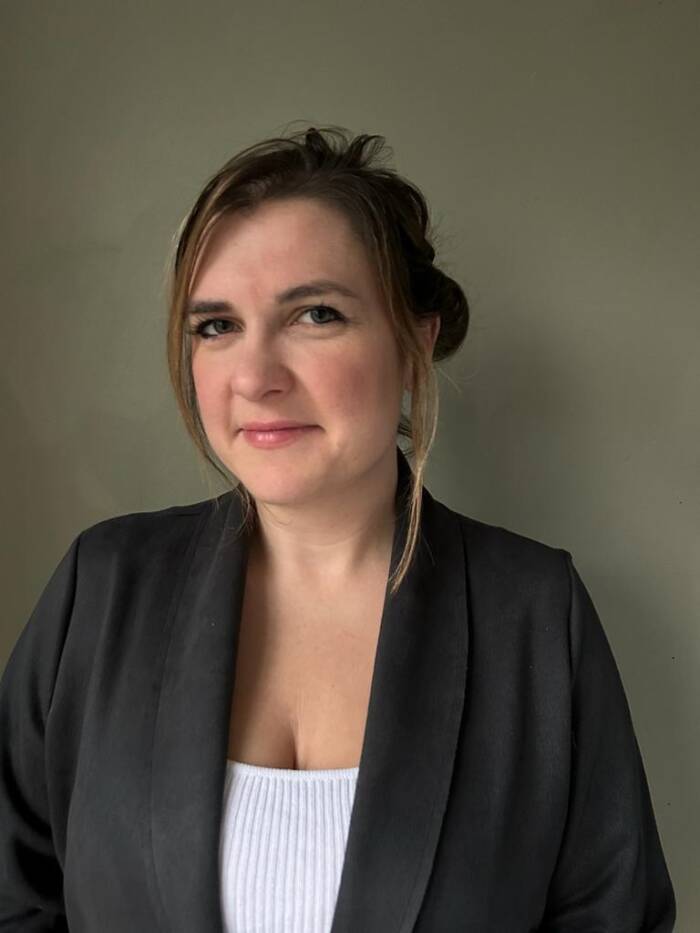Did you enjoy school?
On the whole, I did enjoy school. I grew up in Newcastle upon Tyne and went to the local secondary school.

My parents were (and still are) committed hippies, so my name was odd and foreign sounding, my clothes were homemade, and my packed lunches were organic. I stood out and was obviously different, but I quickly learned to feel comfortable in my own skin. Learning, and embracing from a young age to own what makes you different, is empowering and school was a good experience for me.
At secondary/high school I also discovered how much I enjoyed competitive sport. Growing up in my parents’ community we only played cooperative games, which didn’t prepare me for how much I would love the achievement of pushing myself further and harder. This mindset is something I’ve embraced and have taken with me throughout my career.
What qualifications do you have?
I studied at Goldsmiths in London, although I won’t say how long ago that was!
More recently I have upskilled myself to meet the needs of the organisations I have worked for. Continual learning is very important to me. I have a Business Analyst Diploma, a Six-Sigma Green Belt and a APMG Change Management Practitioner qualification.
It can be a struggle to fit training and development alongside a job, children and generally still trying to be a moderately functioning human being, but it is something I make time for. For me, having an academic understanding of the areas I am trying to approach is a must, like a builder having a toolbox of things they can use.
I have been lucky to build skills and expertise by working with, and talking to, inspirational people in my field and sector. I have a really broad network across central government, 3rd sectors, and commercial business, I can draw on for advice, skills sharing and collaborating. I am always on the hunt for opportunities to get involved in new areas of work, especially areas a business hasn’t tried yet.
Has your career path been a smooth transition, a rocky road or a combination of both?
I would not describe my career as ‘a smooth transition’. I am proud to have successfully brought innovation into roles in the commercial, charity and central government sectors. Adapting quickly to new industries is something I have embraced – each time, building on new perspectives and ideas.
I enjoy roles with lots of ambiguity, so some roles suit me better than others. I love positive disruption and am always looking to try new things which can lead to some really interesting roles and responsibilities.
What is the best career advice you can give to others?
‘Anyone can be digital.’ I am someone from a non-tech background who is now leading new developments in a technology directorate in central government. You don’t need to have an academic background in IT to work in this field, but you do need to be curious, agile and ready to engage with a diverse range of stakeholders. This describes a lot of people that might not have considered a career in digital.
If you had to pick one mentor, that had the biggest influence on you, who would it be?
I have genuinely had the opportunity to work with so many inspirational people, as part of informal relationships and formal mentoring programmes. It would be really difficult to pull out one, but most recently I have been supported by Kevin Antao, digital disruption consultant for NSPCC, who has been helping me with my personal development.
We have a very informal style of communication which suits me best. We regularly send each other voice notes when we have an idea or thought or a challenge I need to reflect on.
From where do you draw inspiration?
Working in innovation means I need to stay on top of literally everything that is happening in the commercial market and civil service environment. This sometimes feels like an impossible task, but I also try to read as much as possible. Podcasts are good too, as the information is digestible, although I often fall asleep at night when I am listening and end up repeating the same section.
I am also inspired by people I work with and meet through work who are leading ground-breaking initiatives or identifying new untried opportunities.
In my day job I work with an inspiring group of colleagues at the DBS who have volunteered to be part of the ‘Innovation Lab’. They come together monthly to collaborate, break down silos and address some of the organisation’s biggest challenges.
Its inspiring to see colleagues supporting each other outside of their busy day jobs and the group generates some really tangible and valuable responses.
What is the biggest challenge you have faced to date?
There have been a lot, so it is hard to pick just one. When you are bringing new innovations to an organisation, it can feel like pushing boulders up hills. They key is early stakeholder engagement, ensuring you don’t meet bigger challenges further down the road.
If you liked this content…
Having started several innovation business functions from scratch, a recurring challenge has been how you quantify the value that innovation brings to the business.
The key to support the organisation’s strategic aims and objectives, while also ensuring you are developing streams which test potential opportunities to also deliver value in the next 5 to 10 years.
What qualities do you feel makes a good leader?
I think it’s important to be a leader who celebrates failure. It is impossible to get every decision right first time, and there are some really valuable lessons to be learned when things don’t work. Enjoying the wins is also super important too though!
By celebrating and sharing failure as a leader, you are creating a culture that encourages everyone to try new things and not to be afraid of putting ideas forward. This trickles down to everyone at an organisation and empowers people to identify and lead on change.
From a work viewpoint what has the last 12 months been like?
It has been a whirlwind introduction to the DBS. Embedding innovation into business practices and developing new approaches to the core business functions has been exciting and challenging in equal measure.
My job is about positively disrupting the status quo. This requires building really strong relationships with colleagues, partners and suppliers, as well understanding the core processes to make a positive change.
When I think about what we have achieved in the last 12 months, it certainly makes everything worthwhile. I’m proud of where we are, and what we will achieve in the future.
What would you say are the biggest tech-based challenges we face today?
There is no longer a choice about whether to be digital or not. I think the challenge is to remain curious and excited when faced with new tech that also brings risk.
Because I am in Innovation, I am always at the forefront of new tech. I have to understand it really quickly and translate it into what will make sense for the organisation commercially. I am really lucky to have been able to lead on and test new opportunities as they are emerging in the market. I’ve been fortunate in my career to work with gaming, NFTs, and AI to name a few.
With so much new digital capability and so many tech solutions available on the market, it is also vital that we don’t try to bend new tech into old ways of working.
What can be done to encourage more women into the industry?
As a member of the Home Office and DDaT ‘ Women in Tech’ group, I believe there is a lot that could and should be done.
First, we have to change perceptions of tech industry, behaviours and culture for school age children as a starting point. Then we need to build on that and get buy in from parents, caregivers and teachers.
It’s a complete education programme to re-programme or undo negative, stereotyped programming that takes place at a very early age. We need to promote positive role models of women in tech to school age children – both male and female.
We need to look at our recruitment and retention processes in the tech industry, to ensure they are accessible to women and meet women’s needs.
For women already in tech, we need to review our continuing professional development offer, to ensure women develop the skills and behaviours we need to realize potential and progress to more senior roles where representation of women drops even lower to five percent across the tech industry.
It starts with changing those people who say girls and boys make inherent career choices at an early age to enter stereotypical male and female professions. If that’s how it is, then we challenge that, and those people responsible for perpetuating that position.
Give us a fact about you that most other people wouldn’t know.
I speak four languages! I lived in Berlin for a year as part of my degree when they were hosting the World Cup (that may have given away my age!), and as a result, my German is pretty tidy.
I also speak Albanian, which is the native language of my husband who I have been hopelessly in love with for almost 20 years. We spend our summers in Albania with the children, so I have lots of opportunities to practice.
Finally, on the language front, there is English and Geordie, which I promise you is really quite different from English, especially after more than one drink.







